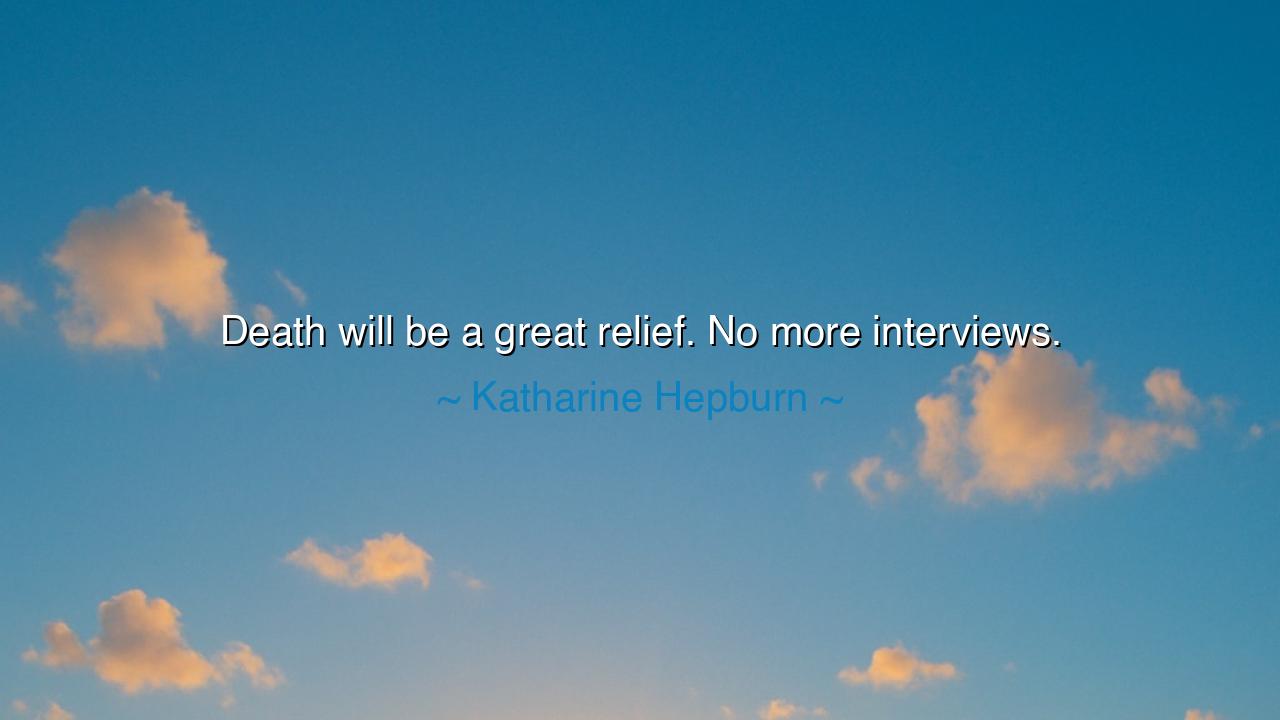
Death will be a great relief. No more interviews.






Hear now, O seeker of wisdom, the fierce and fearless words of Katharine Hepburn, a woman who lived like a flame—bright, untamed, and unbowed. She once said with her characteristic wit: “Death will be a great relief. No more interviews.” In this sentence, wrapped in humor and irony, lies a profound reflection on the burdens of fame, the weariness of scrutiny, and the human longing for peace after a lifetime of performance. Beneath the jest, there beats a timeless truth: that every soul, no matter how celebrated, yearns for rest from the endless noise of the world.
To understand her words, one must know the woman who spoke them. Katharine Hepburn, born into privilege yet forged in fire, became one of Hollywood’s greatest stars, famed not only for her talent but for her unyielding independence. She defied convention—refused to conform, refused to apologize for her sharp tongue or her solitude. Yet behind that iron will lay a spirit often harried by the demands of public life. Her quip about death and interviews was more than a joke; it was a weary sigh from a soul tired of being examined, questioned, and misunderstood. In her own way, Hepburn revealed the eternal human desire to be seen not as spectacle, but as self.
The ancients knew this longing well. The philosopher Diogenes rejected the adoration of crowds, choosing a barrel over a palace, for he said that freedom could not dwell where flattery reigned. Similarly, Hepburn’s jest carries the wisdom of those who recognize that constant attention is its own form of imprisonment. To live forever beneath the gaze of others is to lose the sanctuary of one’s own thoughts. When she spoke of death as relief, she meant not despair but release—release from the endless performance demanded by fame, from the masks one must wear before the multitude.
Her words echo, too, the fatigue of all who live under expectation. Whether one is a public figure, a leader, or a humble worker, the world often demands performance rather than authenticity. To live truly, one must carve out silence within the noise—to retreat into one’s own spirit, to find stillness. Death, to Hepburn, symbolized that final stillness: a place where there are no more questions to answer, no more personas to uphold, no more mirrors held up by strangers. It is a kind of spiritual homecoming, where the soul, long burdened by the world’s curiosity, may at last rest in truth.
Consider the story of Emily Dickinson, the poet who rarely left her home and shunned the public eye. In her solitude, she found a purer form of expression—one untainted by applause or judgment. She too would have understood Hepburn’s sentiment, for she once wrote, “Publication is the auction of the mind of man.” Both women, though from different worlds, grasped the same lesson: that a life lived for the gaze of others can rob the soul of peace, and that silence, whether in life or death, can be the highest form of freedom.
Yet Hepburn’s words are not morbid—they are mischievous, vital, even triumphant. She laughs in the face of mortality, turning death itself into a punchline. This is her final act of rebellion, her last performance: to strip death of fear and dress it instead in wit. In this, she teaches a lesson of rare courage. We must not dread the end, but see it as a return to simplicity, a casting off of all that weighs us down—be it duty, fame, or the endless demand to explain ourselves. Death, in her eyes, is not an enemy but a gentle curtain closing on the great stage of life.
Take this wisdom into your own heart, O listener: do not wait until death to find your peace. Learn to withdraw from the noise while life still hums around you. Seek moments of stillness, free from the interviews of expectation and the applause of approval. Speak truth without needing to be admired. Create, live, and love without the burden of explanation. For the greatest relief is not found in death, but in authentic living—in daring to be wholly yourself amid a world that constantly demands your performance.
And when at last your days are done, may your spirit, like Hepburn’s, meet death not with fear but with a smile—a wry, knowing smile that says, “At last, the questions are over.” For the soul that has lived truly needs no interview; its story is already written in the courage of its being.






AAdministratorAdministrator
Welcome, honored guests. Please leave a comment, we will respond soon